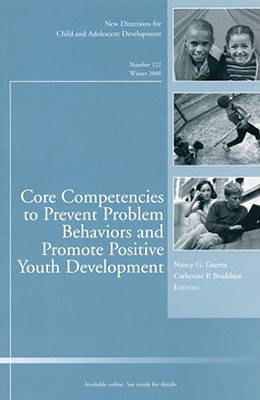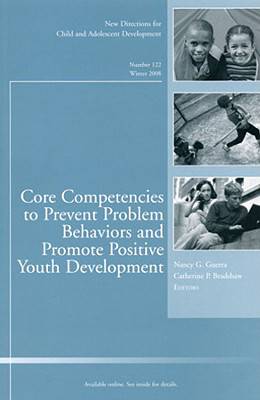
- Afhalen na 1 uur in een winkel met voorraad
- Gratis thuislevering in België vanaf € 30
- Ruim aanbod met 7 miljoen producten
- Afhalen na 1 uur in een winkel met voorraad
- Gratis thuislevering in België vanaf € 30
- Ruim aanbod met 7 miljoen producten
Zoeken
Core Competencies to Prevent Problem Behaviors and Promote Positive Youth Development
New Directions for Child and Adolescent Development, Number 122
CAD (Child & Adolescent Development)
€ 30,95
+ 61 punten
Omschrijving
Adolescence generally is considered a time of experimentation and increased involvement in risk or problem behaviors, including early school leaving, violence, substance use, and high-risk sexual behavior. In this volume, the authors show how individual competencies linked to well-being can reduce youth involvement in these risk behaviors.
Five core competencies are emphasized:
- a positive sense of self
- self-control
- decision-making skills
- a moral system of belief
- and a prosocial connectedness.
This is the 122nd volume of the Jossey-Bass quarterly report series New Directions for Child and Adolescent Development. The mission of New Directions for Child and Adolescent Development is to provide scientific and scholarly presentations on cutting edge issues and concepts in the field of child and adolescent development. Each volume focuses on a specific bnew directionb or research topic, and is edited by an expert or experts on that topic.
Specificaties
Betrokkenen
- Auteur(s):
- Uitgeverij:
Inhoud
- Aantal bladzijden:
- 99
- Taal:
- Engels
- Reeks:
- Reeksnummer:
- nr. 122
Eigenschappen
- Productcode (EAN):
- 9780470442166
- Verschijningsdatum:
- 1/12/2008
- Uitvoering:
- Paperback
- Formaat:
- Trade paperback (VS)
- Afmetingen:
- 147 mm x 221 mm
- Gewicht:
- 158 g

Alleen bij Standaard Boekhandel
+ 61 punten op je klantenkaart van Standaard Boekhandel
Beoordelingen
We publiceren alleen reviews die voldoen aan de voorwaarden voor reviews. Bekijk onze voorwaarden voor reviews.











